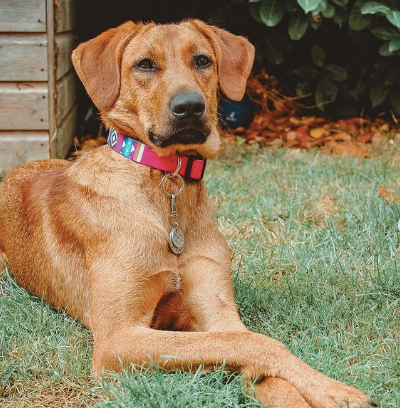
The Truth About Rescuing a Dog
We all know dogs aren’t easy. They come with their own brain and their own personalities and quirks that can often make it challenging for an owner to overcome. Whether you have spent hours googling ‘how to stop my puppy shredding all our toilet paper’ or stayed up all night reading books on dog poop and how to walk nicely on the lead, dogs still like to be a little bit tricky. But as this doesn’t put us off buying a puppy, it shouldn’t put us off rescuing a dog.
What is your experience of rescuing a dog?

Both my partner and I work with dogs. We decided long ago that for us, rescuing was the only way having seen in both our jobs how many pups end up in rehoming shelters. It was difficult going through the process of applying and searching and applying and searching. We got rejected more than enough times to truly wonder whether a dog was actually on the cards for us. But it took perseverance, determination and a unique belief that the right dog would come to us in their own time. We work full time, have two cats and know we want children in the future – all of which can be big alarm bells for rescue centres, therefore drastically limiting the dogs available to us. We joined groups on Facebook – local rescues, independent rescues, UK rescues, breed specific rescues and rescues abroad – and ended up spotting Bonsai on there. Having spent the day crying that no rescue wanted to accept us as good adopters, we weren’t expecting to hear back at all. After applying during an ad break on a home improvement programme we were watching, we got a phone call within minutes and were able to meet Bonsai the next day – luckily she was in a foster home ten minutes down the road. I like to see this as fate, okay. Two days later, she came home with us, after doing a scent exchange with our cats’ blanket and Bonsai’s bed. We were told she was unruly, mouthy and still very much a young, exuberant puppy. When she arrived home, she had her usual five month old puppy quirks but even now, she is easily the most well behaved, non-aggressive dog we have ever met. We are both aware we lucked out big time with Bonsai. She is a joy and 100% the dog we had been searching for, for a very long time. However, she still has her challenges, the same way she would had we bought her as an eight week old puppy. And it has taken time.
So why do people shy away from rescuing?
Some people choose not to rescue because they have a specific breed in mind and/or have a specific job they need their dog to do. Others have tried to rescue but have had their applications rejected. And others have simply always wanted a puppy. Believe it or not, there are thousands of puppies in rescue centres right now, waiting for their forever homes. Especially with the vast rise in bought puppies over this year’s lockdown, little ones have found themselves in shelters up and down the country having inevitably grown up to be a little trickier than anticipated. This trickiness is commonly misconceived as ‘rescue dogs are damaged goods’ and I’m here to put your mind at rest. Because whilst rescue dogs can, of course, be challenging, they are by no means more challenging than a puppy bought from a breeder.
It is estimated that 1 in 4 of us bought a puppy this year during the nationwide lockdown. Research has also estimated that on average, 130,000 dogs find themselves in rehoming centres each year. This same research recognised behavioural problems as the main reason dogs were handed in to shelters. When I ask people why they bought a puppy over rescuing a dog, their most common response is the above. That rescue dogs have too many issues, are too traumatised from their past, and in return, have incurable aggressions, nerves, anxieties and misbehaviours. Here’s the truth: many of them do.
Why do people choose to rescue a dog?
Here’s another truth: many rescues don’t have issues. When asking people who rescued why they chose to rescue, the answer was simple: they wanted to give a dog a second chance. Because that’s all it is really – we’re giving a dog another chance at life, another chance to be loved, another chance to learn and grow and develop in their own time.
Many adopters love the challenge a rescue dog can bring and they have the means to accommodate difficult and hard to rehome cases. Please don’t think you have to be one of those people in order to be accepted for a rescue dog! There are far too many rescue dogs needing homes and the right one is out there waiting for you.

What do I do if I want to find my rescue dog?
Here is what you need to know: no two dogs are the same. Any dog of any age can have any number of issues – from as little as just chewing your shoes, to being food aggressive, dog aggressive and cat aggressive – and let’s throw in separation anxiety just for fun! But what’s important to remember is that these issues can be managed and worked through, regardless of their severity. We are able to show rescue dogs the exact same dedication we would show an eight week old puppy when bringing them home.
So here in the UK, there are two main ways we can rescue a dog. There are also rescuing options with The Kennel Club however, I’ll only discuss the two main routes people usually take when on the search for their perfect rescue pup. We can rescue from within the UK or we can rescue from abroad. Every rescue centre, wherever they are, is always inundated – this goes without saying. But I’ll break down the main differences with the two options.
Rescuing in the UK often comes with a strict criteria. There are many points you have to meet when rescuing that, when buying a puppy, you wouldn’t always have to. It depends on the dog you are applying for but the criteria often includes your working hours, how many pets you already have, whether you have children, if you have a garden and asks for details on your experience with dogs. Please don’t let this put you off! Whilst finding the right rescue dog takes time and patience, it can – and will – happen for you!
All rescue centres differ in protocol but generally if your application is accepted, you will be invited to meet the dog at either the rescue centre, or the foster home they currently live in. This is extremely helpful! It means you have the opportunity to interact with the dog before bringing them home and it gives you the time to introduce them to any other members of the family – including children and other pets.
Rescuing from abroad is almost a whole different breed, if you will! Rescue centres will have websites where you can select your dog from an online portfolio. You will still have to apply and a member of the team will call you to discuss your application further. Once you’ve been accepted, in some cases, pictures and videos of your pup are sent to you prior to their arrival. This is the best! Some rescues even go as far to film your pup’s journey to the UK, right up until arrival! Mostly, they will travel with other dogs heading to their forever homes as well. I know of rescues that have been dropped straight to your door and others who meet you at a designated location for collection. Sometimes, if the home doesn’t work out, rescue dogs from abroad can end up in UK foster homes – this is how we found our rescue pup!
Rescuing from abroad means that your dog has been living with other dogs whilst at the shelter and whilst living on the street, so can often be more socialised than a rescue dog from the UK. Most rescue dogs from abroad come from the streets whereas most rescue dogs in the UK come from homes – and through no fault of their own. However, street dogs coming into the UK to live in home environments means they most likely have not been housetrained, regardless of their age, and may take longer to adjust to life in a warm home. Sometimes, it can often feel like you are getting a puppy, even if your rescue pup is in their twilight years. And that’s okay! Because like a new puppy, rescue dogs need time and owner dedication when they first move in with you.
All rescue dogs need time to acclimatise. Experts say it takes two weeks for a dog to fully decompress in their new home and a further three months to fully settle in and learn the routine of your home and life. Allow them this time and if the rescue centre is reliable and responsible, they will offer lifetime support and behaviour support, the same way a good reputable breeder should.
Take Home Message
Having a rescue can be super hard work, as can a new puppy. Both are not guaranteed to be the perfect dog for you, or the dog you always dreamt you could have. A dog, after all, has its own personality; they are not robots. Hard work, consistency and a hell of a lot of patience will make that dog more suited to you, your family and your lifestyle – no dog will ever be perfect the day they arrive. They have to adjust to you and your family. But surely that’s the best part of having a dog? Giving them the time to build a relationship with you so that they can learn, we only ever wish to love them.

Thank you to Poppy (Insta of her rescue: @thetailofbonsai) for this lovely insight to Rescue Dogs.
If you liked this blog you may also like:
Choosing a breed for your lifeWhy a Pomsky would suit me
Get to Know the German Shorthaired Pointer
